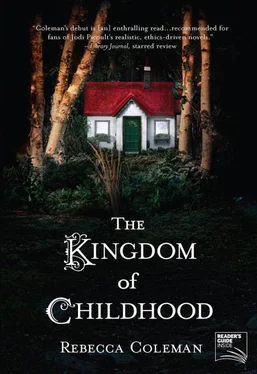Rebecca Coleman - The Kingdom of Childhood
Здесь есть возможность читать онлайн «Rebecca Coleman - The Kingdom of Childhood» весь текст электронной книги совершенно бесплатно (целиком полную версию без сокращений). В некоторых случаях можно слушать аудио, скачать через торрент в формате fb2 и присутствует краткое содержание. Город: Ontario, Год выпуска: 2011, ISBN: 2011, Издательство: MIRA Books, Жанр: Современная проза, на английском языке. Описание произведения, (предисловие) а так же отзывы посетителей доступны на портале библиотеки ЛибКат.
- Название:The Kingdom of Childhood
- Автор:
- Издательство:MIRA Books
- Жанр:
- Год:2011
- Город:Ontario
- ISBN:978-1-4592-1383-8
- Рейтинг книги:5 / 5. Голосов: 1
-
Избранное:Добавить в избранное
- Отзывы:
-
Ваша оценка:
- 100
- 1
- 2
- 3
- 4
- 5
The Kingdom of Childhood: краткое содержание, описание и аннотация
Предлагаем к чтению аннотацию, описание, краткое содержание или предисловие (зависит от того, что написал сам автор книги «The Kingdom of Childhood»). Если вы не нашли необходимую информацию о книге — напишите в комментариях, мы постараемся отыскать её.
was a semifinalist in the 2010 Amazon Breakthrough Novel Competition. An emotionally tense, increasingly chilling work of fiction set in the controversial Waldorf school community, it is equal parts enchanting and unsettling and is sure to be a much discussed and much-debated novel.
The Kingdom of Childhood — читать онлайн бесплатно полную книгу (весь текст) целиком
Ниже представлен текст книги, разбитый по страницам. Система сохранения места последней прочитанной страницы, позволяет с удобством читать онлайн бесплатно книгу «The Kingdom of Childhood», без необходимости каждый раз заново искать на чём Вы остановились. Поставьте закладку, и сможете в любой момент перейти на страницу, на которой закончили чтение.
Интервал:
Закладка:
At the side of the church was a little stone chapel dedicated to the Virgin Mary. Judy leaned against the entryway and looked around inside. The little room was cool and quiet. On one side stood a black iron stand filled with flickering candles; straight ahead, two short pews offered visitors a place to sit or kneel. At the very back stood the statue of the Virgin, its stone pure white and soft-looking, like chalk. Beneath one of her feet was a crescent moon; beneath the other, a serpent. A crown of dull metal stars circled her head. Several times since the early spring Judy had made this journey, never crossing the threshold but simply looking in—not quite with the detachment her father showed toward such things, but not quite with the belief of her classmates, either. Like an infant she had begun to form the most primitive impressions of these human icons, based formlessly on blind need. In the barn there was Christ, under whom thrived warmth and friendliness and raw gentle life. In this low stone building there stood Mary, who commanded peace and quiet, who was a mother but never trembled or stumbled or violated or was violated. The human tribe owed its people one or two who were beyond reprimand. One or two—and that was all—not subject to the vagaries of the body or the mind, through whom the light could slip as it does between immovable stones. Such people, if they could be relied upon, would be the beginning and end of everything. They would look down from heaven upon a selfless girl, one who stood nearly naked beneath the stars, and shower her with blessings. For the world was fair.
From the doorway, she whispered the Ave Maria her teacher had taught her.
Then she hiked her rucksack higher on her shoulders and walked home.
A rat-a-tat sound emerged from her house, faint at a distance, while Judy was still as far away as Rudi’s place. The noise ceased as she started up the walk that wound to the back door. She pushed it open, and there on her mother’s coffee table stood a young woman of about Kirsten’s age, gathering her skirt while Kirsten knelt on the floor beside her with a mouthful of pins. Kirsten barely looked up. “ Guten Tag, Judy,” she murmured through her closed lips, and continued pinning up the hem.
“So that’s his daughter,” said the other girl, in German. “She’s small.”
“She can understand you,” Kirsten replied in a warning tone. To Judy she said, “This is Eva. She’s a friend of mine.”
Judy offered no greeting, letting her rucksack slip from her shoulders and thump to the floor beside the radiator. She had lately taken to leaving messes for Kirsten to clean up—harmless disorder for the most part, with occasional minor catastrophes for which Kirsten would be blamed. On the dining table sat a sewing machine, the one from the storage room, which Judy’s mother had never used. Large scraps of cloth, eggshell white and sprigged with tiny pastel flowers, lay in heaps on the table. A pair of pinking shears sprawled open, like the gaping mouth of a wolf in a fairy tale. The rounds of its handles looked to Judy like cartoon eyes. She ran a finger across the line of triangles along the blade.
“Don’t touch that, Mausi, ” said Kirsten, using the nickname Judy had lately come to hate. Where once it had seemed so fond, it now seemed calculated to emphasize her insignificance.
She looked up at the girl who stood on her coffee table, bare-shouldered in the half-finished sundress. The girl’s dark hair was neatly rolled and arranged. Her features were strong, with a shapely jaw and brows that made her eyes look daunting, but her bow-shaped mouth was almost petulant. She looked down at Kirsten’s pinning and said, “I think you should make it shorter.”
Kirsten gave a scandalized little cry. “ Eva . Wouldn’t be ladylike.”
“Rudi would like it.”
She laughed. “Oh, Rudi.” With a few smacks at the base of the skirt to shake out the wrinkles, she added, “There. All straight now. Take it off.”
Eva shrugged out of the dress, which Kirsten caught as it fell. Judy watched the young woman, clad only in her bra and girdle, as she stepped down off the table and lit a cigarette. She shook out the match and raised an eyebrow at Judy.
The sewing machine clattered on. Judy turned and walked into the kitchen, which smelled, in a way that tingled in the back of her throat, like sauerbraten. Very quietly she turned off the burner beneath the Dutch oven, watching the small blue flame diminish and then disappear. But that was too obvious. Kirsten would know she had turned it off to be spiteful. It would be better if she turned the gas back on but left the burner unlit, so it would look like a problem with the stove. Kirsten would know better, but have no proof.
She turned the dial back to its previous setting, hearing the very quiet hiss grow ever so faintly louder.
“Mausi.”
She looked at Kirsten, whose gaze was locked on the rattling machine.
“Bring me the basket from the storage room. The one that has the thread in it.”
Judy stared at her impassively. “Ich verstehe nicht.”
Kirsten looked up. “Yes, you do. You know what thread is.” She tapped the spool at the top of the machine.
With a reluctant shift of her shoulders through the doorway, Judy headed down the hall to the storage room. The basket, frilled at the top in calico, sat on the shelf directly ahead. She passed it and turned the corner of the small, L-shaped room. She kicked at an old typewriter sitting on the floor, then ran her hand along the winter coats hanging from the rod: her father’s khaki trench coat, her mother’s camel’s-hair coat that fell to her ankles and was now certainly too small, and her own green wool coat with the deep cuffs. She pressed her face into it and hoped to smell winter.
“Judy!” called Kirsten.
There was a murmuring of conversation. The other girl’s voice rose, and Judy heard the creak of footsteps moving across the floor. A moment later she heard a shriek.
Kirsten sounded alarmed. “What is it?”
“The gas is on, but the burner isn’t lit. My God.”
Judy stepped between the coats and, although hers hung mostly above her head, wrapped herself in its bottom. A moth fluttered out. She ducked against its gray, flapping wings, and then thought, of course. Her mother had not been in a state to put it in mothballs. By next winter it would be full of holes.
“Judy!” shouted Kirsten, this time with far greater urgency.
She spun around in the coat as if it were a cocoon, pulling until it came down from its hanger and wrapped around her torso. Below it her summer skirt lifted from her spinning, floating in a circle, like a dancer’s.
On the last day of school, as soon as the bus dropped her off, Judy took off at a run down the country road toward her home. Her rucksack, empty but for a single book, thumped against the small of her back with each footfall. The trials of home were, for a few precious moments, forgotten. She carried two parting gifts from her teacher, who knew she would not be back for the following school year: the Struwwelpeter book, which she carried in her pack, and a large gingerbread heart with Viel Glück written on its face in jaunty pink icing. A good-luck wish for our newest friend, her teacher had declared, smiling upon Judy fondly. The heart, wrapped neatly in wax paper, she cradled against her body as she ran. She wanted to share it with Rudi, because she knew he liked gingerbread, and also because it was a heart. It smelled mouthwateringly of cinnamon and confectioner’s sugar. When the barn came into view she picked up her flagging pace, crunching gravel beneath her saddle shoes as she cut across the driveway, then criss-crossed the perfectly manicured front lawn.
Читать дальшеИнтервал:
Закладка:
Похожие книги на «The Kingdom of Childhood»
Представляем Вашему вниманию похожие книги на «The Kingdom of Childhood» списком для выбора. Мы отобрали схожую по названию и смыслу литературу в надежде предоставить читателям больше вариантов отыскать новые, интересные, ещё непрочитанные произведения.
Обсуждение, отзывы о книге «The Kingdom of Childhood» и просто собственные мнения читателей. Оставьте ваши комментарии, напишите, что Вы думаете о произведении, его смысле или главных героях. Укажите что конкретно понравилось, а что нет, и почему Вы так считаете.












